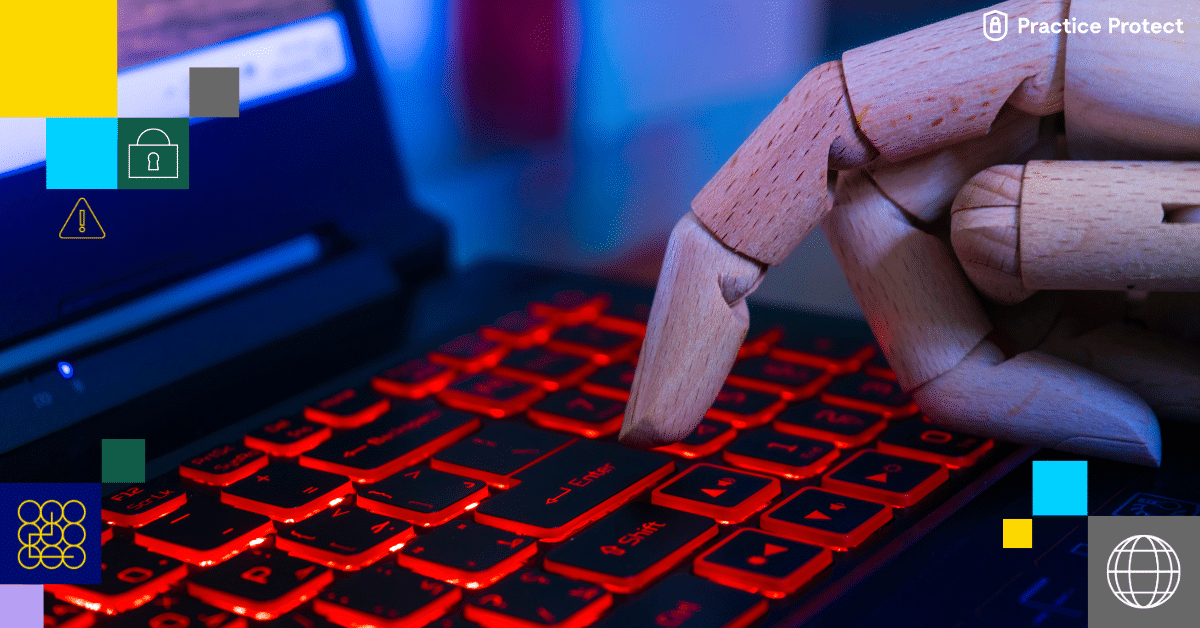Why AI is an Emerging Threat for Accountants: A Cybersecurity Perspective
Blog Understanding Cybersecurity

AI is transforming various industries, and accounting is not immune to the change. While AI offers significant benefits, it also brings cybersecurity challenges which pose a serious threat to accountants. With this technology criminals get into your firm easier than ever – learn how they attack and how to protect yourself and your clients in this article
The Intersection of AI and Cybersecurity
AI can be a force for good, but it can also be used for evil. Below are some of the ways the AI revolution is being used to attack accounting firms.
- Automated Attacks:
- Sophisticated Threats: AI can be used by malicious actors to create more sophisticated and targeted attacks. These attacks can take the form of spam, phishing as well as malware injections. With the strength of AI, it can be possible to bypass traditional security measures which haven’t been built to cope with the AI threat.
- Speed and Efficiency: AI-driven attacks can be executed rapidly and efficiently, leaving little time for accountants to respond and mitigate the damage. With automation and AI comes rapid speed deployment of targeted attacks which used to be more reliant on human touch, this allows criminals to attack more firms at once than what was previously possible.
- Vulnerabilities in AI Systems:
- Exploitation of Weaknesses: AI systems themselves can have vulnerabilities which, if exploited, can lead to unauthorized access to financial data. AI is still a fairly new technology, and criminals are learning how to exploit vulnerabilities in systems as software rolls out AI integrations as fast as possible.
Data Breaches and Financial Security
Data breaches are a significant concern in the accounting profession, and AI can exacerbate these risks. Accounting firms can find themselves particularly vulnerable to these kinds of attacks due to the nature of data they keep on their clients.
Accountants handle vast amounts of sensitive financial information, making them prime targets for cyber-attacks. A breach can lead to severe consequences, including financial losses and reputational damage.
The Evolving Threat Landscape
The cybersecurity landscape is continuously evolving, with AI playing a dual role as both a tool for defense and a weapon for attackers. Here at Practice Protect, we often use AI in our cybersecurity features to outsmart the criminals at their own game. Below are just a few ways that AI can be used to defend accounting firms.
This is done a lot through AI-Powered defense mechanisms:
- Anomaly Detection: AI can help detect anomalies and unusual patterns in financial data, as well as throughout your entire operation ecosystem if the right anti-virus/threat-detection is set up. This allows your cyber security provider to always be searching for potential security breaches and sequester them away before you even realize there was a threat.
- Threat Prediction: AI systems can predict and identify potential threats before they materialize, with AI behind it, the data models are looking for patterns of similar attacks historically and applying the learning algorithm throughout the entire knowledge base. What this means is as soon as a new threat occurs anywhere it is installed, the entire database will be updated with this new knowledge.
Protecting Accountants in the Age of AI
To safeguard against the cybersecurity threats posed by AI, accountants and organizations must adopt proactive measures to protect themselves.
- Robust Cybersecurity Protocols:
- Regular Audits: Conduct regular security audits to identify and address vulnerabilities in any of your systems, you can work together with your cybersecurity partner to do this on your behalf.
- Multi-Factor Authentication (MFA): Implement MFA to add an extra layer of security to sensitive financial accounts and data, better yet work with your cybersecurity partner to move towards a passwordless offering.
- Employee Training:
- Cybersecurity Awareness: Train staff on the latest cybersecurity threats and best practices to recognize and avoid phishing and social engineering attacks. This is key and, in many cases, required if you wish to keep or obtain cyber insurance, or prove to the government you have taken reasonable precautions to protect client’s data.
- Advanced Security Solutions:
- AI-Driven Security Tools: Utilize AI-driven security tools to enhance the protection of the firm and your client’s information. Working with your partner you should be able to get access to the leading AI-powered anti-virus software and email security.
Moving Forward: Balancing AI and Cybersecurity
While AI presents significant cybersecurity challenges, it also offers solutions which can enhance the security of accounting practices. The key lies in balancing the adoption of AI with robust cybersecurity measures to protect sensitive financial information.
As AI continues to become a mainstay of the accounting profession, understanding and addressing the associated cybersecurity risks is crucial. By adopting proactive security measures and staying informed about the evolving threat landscape, accountants can mitigate the risks and harness the benefits of AI.
If you are not sure your firm is protected against an AI world, book in a time to chat with one of our cybersecurity consultants.

